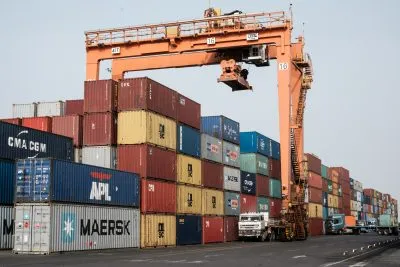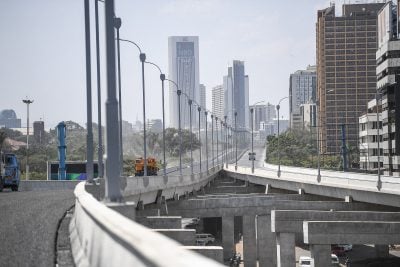The United Nations International Fund for Agricultural Development (IFAD) wants to make farming more profitable and halt the youth exodus from the land. Its president Gilbert Houngbo tells African Business how this can be achieved.
For tens of thousands of young farmers toiling on generations-old family plots outside Nairobi, the pull of the big city proves more irresistible every year. As the energetic metropolis creeps further into surrounding areas, the prospect of a new career and a new way of life act with magnetic force on youngsters raised on humble corn and potato plots in the rural hinterland.
Since 1986, Nairobi has doubled in population, part of an unprecedented rural exodus to urban areas. The average age of a farmer in the country is 60, according to the United Nations Development Programme – an alarming stat in a nation where those under the age of 35 represent 78% of the population.
Unless Africa can find answers to the push factors of climate change, limited capital and restricted opportunity, food security could be at risk, Gilbert Houngbo, president of the United Nations’ International Fund for Agricultural Development (IFAD), tells African Business.
“You need to keep in mind that 80% of crop production today in Africa comes from smallholders… If you really want to improve food security and nutrition, you can’t avoid those producing 80% of your food,” he says.
Funding smallholders
Led since 2017 by Houngbo, a softly spoken former prime minister of Togo, IFAD’s mandate is to invest in rural people, enrich food security and boost smallholder income. While it commands a lower profile than other UN agencies, IFAD’s decades-long mission chimes with policymakers’ hopes for a “Green Revolution” in Africa. In common with African Development Bank president Akinwumi Adesina, who leads calls for a new generation of agricultural billionaires, Houngbo says that IFAD hopes to combat the youth exodus by linking farming with entrepreneurialism and success. The World Bank estimates that the African food market will be worth $1 trillion by 2030.
You need to keep in mind that 80% of crop production today in Africa comes from smallholders… If you really want to improve food security and nutrition, you can’t avoid those producing 80% of your food
“Whether they can be a billionaire is maybe a different question, but can they be successful and earn a decent living and income from agriculture? Absolutely yes. The market is there for people to be richer, but even if they don’t become billionaires, if they can be rich enough to have a decent life and raise their family in a rural setting, it will be a good way forward.”
For that to happen, Houngbo admits there must be a sea change in how smallholders are supported on the continent. Too many are wedded to unproductive tools and outdated land husbandry techniques in an era where technology and modern fertilisers are reshaping possibilities. Without a paradigm shift, the UN’s Sustainable Development Goal of doubling the productivity and income of smallholder farmers is unlikely to be met.
“The whole productivity spectrum will require a shift in some of the parameters. Barely 4 or 5% of arable land is irrigated, compared to 40% in Asia, for example. In Africa the average farmer will use 13 kilos of fertiliser per hectare, [compared to] maybe 100 in Asia. So it’s clear that has a direct impact on productivity. There’s also the matter of making sure smallholders have access to improved seeds that are both resilient to drought and flood,” he says.
Welcoming big business
IFAD plans to spend at least $3.5bn over the next three years by focusing on youth, women, nutrition, and climate-smart agriculture. The fund backs a diverse array of projects, from aquaculture in Kenya to financial markets access in Malawi. A common theme is the critical role that large private sector operators can play in energising the smallholder ecosystem. IFAD’s goal is to transform smallholders into profitable businesses that supply local and national markets, generate surpluses, and offer rural people – particularly the young and women – a viable future. To achieve this, Houngbo says that the fund is linking big business, a potential customer and source of training and tools, to the smallholder community.
“More and more with access to the right technology, a five hectare producer can be very successful and intensive. The private sector or larger size farmers can automatically become a market for smallholders,” he says.
In September 2017, IFAD penned an agreement with US food giant Mars to offer smallholder farmers training, technology and access to tools. That agreement builds on a partnership in Indonesia, where the partners opened centres to educate and tool cocoa farmers – an initiative which Houngbo says has tripled production, allowing farmers to reach out to other buyers while offering Mars reliable supply. This blended approach could deliver elsewhere, Houngbo says. A 2013 study estimates that only 7% of smallholders participate in tight value chains in which they operate at least two hectares of land and take a more business-like approach to farming.
“Generally speaking investment in agriculture is not something that is naturally appealing to the sector, so you have to be very incentivised or determined. Knowing the groundwork in the community, we use that knowledge and bring in the private sector for them to invest directly, or with us in a blended approach to financing.”
In a bid to improve their bargaining power with larger operators, Houngbo encourages young farmers to join farming organisations and cooperatives. Yet climate change complicates such youth-oriented efforts. As temperatures fluctuate and floods, droughts and other climate events become more common, a commitment to the sector carries ever-greater risk for young smallholders. In response, IFAD launched the Adaption for Smallholder Agriculture Programme (ASAP), a scheme to help smallholders deal adapt via environmentally friendly farming techniques, access to renewable energy, and engagement with the private sector and policymakers.
Generally speaking investment in agriculture is not something that is naturally appealing to the sector, so you have to be very incentivised or determined.
Whether playing their part in the fight against climate change or creating an enabling environment for business, Houngbo says policymakers must now step up to the plate. Having sidelined farming at the expense of commodities-led growth over recent decades, many politicians have a poor record in boosting agriculture. Houngbo believes that the importance of smallholders is finally sinking in.
“What you see more and more in countries in Africa is a genuine political interest in the agriculture issue. Obviously it’s one thing to go from political will to the right policymaking. Of course no solution fits all so you need to take into account each country and situation, but the political will is more and more there.”
David Thomas
Want to continue reading? Subscribe today.
You've read all your free articles for this month! Subscribe now to enjoy full access to our content.
Digital Monthly
£8.00 / month
Receive full unlimited access to our articles, opinions, podcasts and more.
Digital Yearly
£70.00 / year
Our best value offer - save £26 and gain access to all of our digital content for an entire year!
 Sign in with Google
Sign in with Google 



